Words of Support for the Fast
|
|
Sue Carter, Retired public school Teacher, Ohio Fair Food
"Once again, as they have so often over the past eighteen years, the Coalition of Immokalee Workers and their allies are meeting grave injustice with courage and strength. By choosing this six-day Fast for Fair Food, the CIW and all who are gathering in Lakeland on March 5 are sending a powerful message to Publix Super Markets to join the Fair Food Program now. The success achieved by the Coalition of Immokalee Workers, in their steadfast commitment to non-violent protest, serves as a lesson to all Americans that we can and must act to end the harvest of shame that has persisted for so long throughout our land.
To Farmworkers: As you prepare for this sacrifice, we celebrate your unprecedented achievement in creating a collaborative model in which buyers, growers, and workers all participate equally and in bringing into the Fair Food Program ten major corporations over the past ten years. Your unprecedented success bears testimony to your unflagging courage in this struggle. The groundbreaking changes which have begun taking place in 90% of Florida's fields show that justice can prevail against powerful odds.
We salute you today as you make this sacrifice to call for an end to brutality and exploitation of workers. Faith groups, human rights groups, and students in Ohio send their messages of support to you all today as you prepare for this fast. I am honored to join you this coming week as you fast and to experience again, as I have in the past, the joy of sharing this amazing journey for justice with you." |
Dr. John Dwyer, retired public school teacher, naples"Gandhi says that 'it is always a good thing to go with others in any matter of self-denial.' Such thinking is in line with monastic fasting during Lent, Muslim fasting during Ramadan, Hindu and Buddhist periods of Ramzan, and many other periods of self-purification, self-restraint and self-denial called for as a practice of faith, sometimes for penance, sometimes to resist political and economic injustices in our non-violent struggle against evil in this world. Sometimes it is undertaken by people with no faith at all, like Kafka's "A Hunger Artist".
Our short 6-day fast is focused to influence Mr. Ed Crenshaw and Mr. Charlie Jenkins Jr. of Publix, Inc. to soften their hearts toward Florida tomato pickers; we pray that they allow the purifying influence of our public self-denial to call their consciences into poignant awareness of their ability to end the century-long exploitation of migrant workers and their families--people who are so poorly paid that they must endure forced fasts when the weather or sickness or other factors prohibit their picking; pickers whose families are so poor they live for months out of their cars in hidden-away parking places on wealthy farmers' land." |
|
|
|
R
|
|
Lucy Butte, California Director of National Farm Workers Ministry
"I am in prayer for you as you begin this very beautiful experience seeking
The church stands with you as you fast for justice. My prayers are that each of the fasters may know that there are many who are joining them in prayer, some fasting and all in solidarity asking our God to break through Publix leadership's hearts and minds that they may do what is just, moral and responsible. And that is to come to the table with farm workers and Immokalee to address farm worker issues." |
Professor Eric Castillo,
|
Josh Viertel
|
Rev. Dr. Jeff Krehbiel
|
Rev. Raymond Kemp, S.T.L.
|
Rabbi Charles Feinberg
|
The Reverand Michael Livingston, National Council of Churches:
Can we live with doing nothing when the companies who hire them or who benefit disproportionately from their labor refuse to acknowledge their responsibility for the plight of farm workers and, like Publix, will not engage in constructive conversation about meaningful change?
We are all in this life together. We are all fed from the bounty of the earth. I am going to join farm workers in Lakeland, FL in a fast as part of the Fair Food Campaign. I do not regard this as a hardship on my part. By God’s grace I can offer the luxury of my time to brothers and sisters whose humanity I value as much as my own. I count it a privilege, as the season of Lent begins, to, as Paul asks of us in Romans 12:1: “…present your bodies as a living sacrifice, holy and acceptable to God, which is your spiritual worship.” |
Professor Carol Anderson, Emory University:
The Campaign for Fair Food is in the same spirit. Martin Luther King, Jr. summarized it best. In his journey to shine a klieg light on the horrific labor conditions endured by the sanitation workers in Memphis, King observed, in the last speech of his life, that “When people get caught up with that which is right and they are willing to sacrifice for it, there is no stopping point short of victory.” That is the core essence of the Campaign for Fair Food and the Coalition of Immokalee Workers." |
Marley Moynahan, Student, Georgetown University, DC Fair Food:
Why Fast? A Reflection on the Fast for Fair Food
"... Fasting as a form of non-violent action – the refusal to be compliant and silent in the face of profound injustice - is the tool of those who believe that every human being amounts to something more valuable than brick and mortar. Those who believe that the path of gross inequality and economic injustice is wholly and unequivocally unacceptable – primarily because it is deeply and morally wrong, and additionally because it is unsustainable in any realistic longer vision of our future.
The Campaign for Fair Food is an amplified collection of voices of farmworkers, young people, people of faith, and many other community members who are breathing life into the possibility of an alternative future. Already, in two decades, the Coalition of Immokalee Workers and their allies have made enormous gains: increased pay for farmworkers in Florida, basic rights in the field such as shade, water, and freedom from violence, and a growing partnership of actors spread across the food chain who are shaping an entirely new, concrete system that fosters dialogue, respect, and accountability. Only last week, Trader Joe’s joined the Fair Food family, demonstrating, alongside Whole Foods, that supermarkets can join the fast food and food service industries in transforming U.S. agriculture from the soil to the kitchen.
Even in the same moment that we congratulate Trader Joe’s and the nine other companies who have signed Fair Food Agreements with the CIW, there are still companies like Publix who are refusing to come to the table – who claim that their hands are clean and they have no role to play...
... That is why, as a young person profoundly invested in the future, as a Publix shopper, as a member of the human family, I am fasting for six days with the Coalition of Immokalee Workers in March. I will not concede to a future which requires routine violence in the name of Publix’s profit – or a future which marks someone else’s suffering as my “gain” in the form of an artificially cheap tomato. The sustainable path that I want to construct, that I am depending on requires dignity and respect for the whole human family – period." read more |
The Reverend Noelle Damico, Presbyterian Church (U.S.A.):
... There are a variety of “purposes” for fasting, but a central purpose is that of reconciliation – to God and to one’s neighbor. From the practice of fasting we should be able to see God’s vision for our world more clearly and become determined to live with integrity. Fasting helps us identify the grave injustices around us, acknowledge and take responsibility for our participation and complicity in such injustice, and prepares us to act with God to transform ourselves and our world.
Prayer is an important compliment to fasting and focuses our confessions and intercessions. Practitioners of fasting often report an intensity to their prayer lives – as if the shedding of food for a period makes space in the mind, heart, body, and soul for God. While fasting heightens the believer’s spiritual awareness, it also brings lasting insights into the physical needs of the body and the daily struggles of those who are hungry and poor. When we fast, we physically experience in a small way the evil of hunger that daily deprives millions of our sisters and brothers of health and life...
... And so you are invited to join this fast for justice and fair food with members of the Coalition of Immokalee Workers. May it be a time of purification for you, as you seek truth and clarity. May it be a time of divine encounter, when you experience the presence and power of God. May it be a time of community, as the workers are strengthened by your witness, and you are strengthened by theirs. And finally, may it be a time of re-orientation, that you may name the patterns of injustice and commit anew to their transformation. May we be the change we wish to see in the world." |
Barry Estabrook, food writer, author of Tomatoland:
But the celebrations were short-lived. The CIW announced that 50 of its members and their supporters would be going on a fast. For six days, beginning March 5, the Fast for Fair Food will take place at the headquarters of Publix Supermarkets, a $25-billion, Florida-based company that operates more than 1,000 stores in the Southeast.
“We are fasting today so that tomorrow none of our children are forced to surrender their dignity or to suffer hunger just to work,” Darinel Sales, one of the workers who will be taking part, wrote in an email. “We are fasting so that the people in charge of Publix can soften their hearts and sit with us to construct a reality in which prosperity is not based on the blood, sweat, and humiliation of farmworkers"...
... No food conglomerate has an excuse, least of all Florida-based Publix. Not only are the state’s tomato workers its customers, but the Publix website boasts about the firm’s “community involvement,” “diversity and inclusion,” and “commitment to our market areas.” It proclaims itself to be Florida’s “neighborhood grocer.”
Maria Brous, Publix’s director of media and community relations, did not return telephone calls. The company has said in press statements that it would be more than willing to pay a penny more per pound if that amount was included in the price the growers charged, but it refuses to pay pickers directly. (Which is odd because under the Fair Food Agreement the extra penny is, in fact, included in the price.) Slavery, Publix says, should be prosecuted under existing laws. And if labor conditions are too strenuous in the tomato industry, the company thinks workers should simply find another employer.
Like the farm owners in the 1990s, executives at Publix have steadfastly refused all requests to enter into dialogue with the CIW. They would do well to remember the famous words of the philosopher and writer George Santayana: “Those who cannot remember the past are condemned to repeat it." read more |
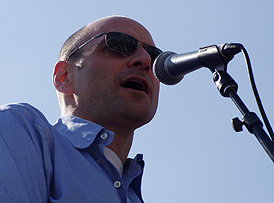 Eric schlosser, author, producer
Eric schlosser, author, producer  Dr. patrick Mason, Professor of Economics, Director of African American Studies Program, Florida State University
Dr. patrick Mason, Professor of Economics, Director of African American Studies Program, Florida State University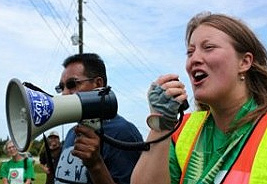 Rev. Allison Farnum, Unitarian Universalist Church of Fort Myers
Rev. Allison Farnum, Unitarian Universalist Church of Fort Myers Kerry Kennedy
Kerry Kennedy  Mr. Martin Sheen
Mr. Martin Sheen  aj patel
aj patel 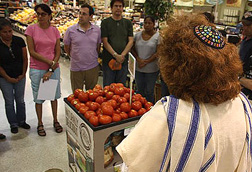 Arielle Rosenberg, Rabbinical Student at Hebrew College,
Arielle Rosenberg, Rabbinical Student at Hebrew College, 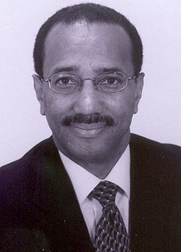 "I love tomatoes. Many of us do. But can we eat them in good conscience when we know that the farm workers who pick them are grossly underpaid and work under conditions that most of us do not and would not tolerate?
"I love tomatoes. Many of us do. But can we eat them in good conscience when we know that the farm workers who pick them are grossly underpaid and work under conditions that most of us do not and would not tolerate? "The decision to fast, to deny one’s body essential nourishment, to turn away from the very sustenance that gives life, can only happen when faced with a soul-crushing oppression that has rendered that very life precarious in the first place. Freedom fighters from Mahatma Gandhi to Anatoly Marchenko fasted to expose brutal systems of oppression. They fasted to make clear that there were no chains, no jails, no retribution strong enough to shackle the quest for dignity and human rights.
"The decision to fast, to deny one’s body essential nourishment, to turn away from the very sustenance that gives life, can only happen when faced with a soul-crushing oppression that has rendered that very life precarious in the first place. Freedom fighters from Mahatma Gandhi to Anatoly Marchenko fasted to expose brutal systems of oppression. They fasted to make clear that there were no chains, no jails, no retribution strong enough to shackle the quest for dignity and human rights.  "Fasting is a spiritual practice embraced by many faith traditions. People of faith may be familiar with fasting at Ramadan within the Muslim community or fasting undertaken during Lent in the Christian community. Fasting has an ancient history and is part of scriptural texts that inspire faith...
"Fasting is a spiritual practice embraced by many faith traditions. People of faith may be familiar with fasting at Ramadan within the Muslim community or fasting undertaken during Lent in the Christian community. Fasting has an ancient history and is part of scriptural texts that inspire faith...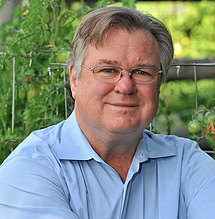 "The Coalition of Immokalee Workers (CIW) should be celebrating. Last week Trader Joe’s signed a Fair Food Agreement with the Florida-based labor justice group. The agreement grants basic rights and higher wages to Florida tomato harvesters.
"The Coalition of Immokalee Workers (CIW) should be celebrating. Last week Trader Joe’s signed a Fair Food Agreement with the Florida-based labor justice group. The agreement grants basic rights and higher wages to Florida tomato harvesters.